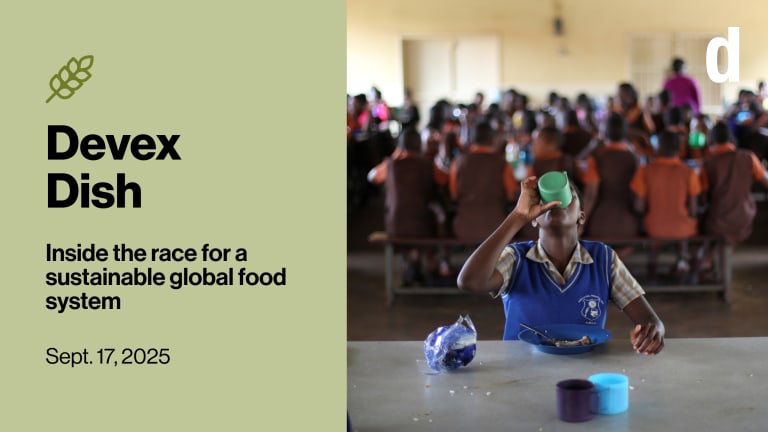UN envoy Brown says donors, governments must up education efforts

UNITED NATIONS — International donors need to reconsider their aid budgets and invest more in global education in order to combat a dangerous trend that would see more than 200 million children still out of school by 2030, says Gordon Brown, the U.N. special envoy for education and the chair of the Education Commission.
Aid recipient countries need to also take responsibility for their own education systems and promote a rapid expansion of free, quality primary schooling, Brown, the former prime minister of the United Kingdom, told Devex in a sit-down interview at United Nations Headquarters.
This could ring up an estimated $2.7 trillion of necessary domestic public expenditures on education by 2030 from low- and middle-income countries, according to the Education Commission. And total international financing for education needs to rise from an average of 11 percent per year to 15 percent, reaching $89 billion, to potentially meet the Sustainable Development Goal that aims to provide inclusive and quality education for all.
“Most countries will have to double the share of the national budget they spend on education,” Brown explained. “And, secondly, the aid budgets are skewed against education. It has fallen to 10 percent of aid, so governments who have got aid, agencies can help. They have got to devote more money to education. We are suggesting 15 percent of aid should go to education.”
Governments and other donors yesterday announced, and in some cases reiterated, recent pledges that total more than $2 billion for education. The European Union pledged $13.2 million to the humanitarian Education Cannot Wait fund, pioneered by Brown’s office. Denmark committed $16.1 million to the fund. The European Union also announced that it would dedicate 8 percent of its humanitarian budget to education in emergencies in 2018, above the global average of 3.6 percent.
The Global Partnership for Education also shared a pledge made earlier this year to leverage $2 billion a year to support 870 million children in 89 countries.
The cost of inaction and low levels of funding will, in the end, be more costly, Gordon warned, especially when considering girls’ education.
“Girls’ education is the civil rights struggle of our generation. And I think it is the freedom fight that has got to be won, because if a girl is educated she is half as likely to lose her child in infant mortality,” he said. “Girls’ education is going to the center of attention because we need to prevent child marriage, we need to prevent child labor, we need to prevent child trafficking — and the surest way of knowing this is having them in school, where they are properly protected.”
Today, about 264 million children and adolescents are not in school. And, with current trends, half the world’s jobs — around 2 billion — could disappear because of automation by 2030, making education even more vital as its role in finding a job is set to rise.
Convincing donors to increase their education-focused aid contributions is feasible, especially given the links education has to the other SDGs, says Gordon.
“We are making the case for governments to spend more on education, and we think that would be possible. It used to be 13 percent and then went down to 10 percent,” he said of education aid levels. “The reason is that we think education unlocks the other goals. It helps for maternal health, for infant health, it helps with employment, it helps with gender equality. So all the different objectives the SDGs are supposed to meet, education unlocks the possibility of doing better on health and environment and on employment.”
One key step in tracking this progress is improving data collection, so it is clear if students are actually graduating from primary or secondary school, for example, and not simply registering. The commission is tackling this through some of its work, as revealed in a update this week on the International Commission on Financing Global Education, a year-old initiative designed to raise additional funding for education.
“You have got to make data compulsory. The only way Britain got 100 percent registration at schools was by making education compulsory. And then you have got to keep records of school attendance and you have got to keep records of progress and examinations and everything else,” he said.
Brown was appointed as U.N. special envoy in 2012.
Read more international development news online, and subscribe to The Development Newswire to receive the latest from the world’s leading donors and decision-makers — emailed to you free every business day.
Read more on Global Goals Week:
▶ Exclusive: UN envoy says new Yemen aid forthcoming
▶ Q&A: Colombia aid head asks donors to tie aid to national plan, build institutions
▶ Could new leadership mean a long-awaited humanitarian aid, development alliance?
▶ Barack Obama on how to convince a nation that development is a bargain
▶ Grande's lesson from Mosul: Engage with military for civilian protection
Search for articles
Most Read
- 1
- 2
- 3
- 4
- 5








